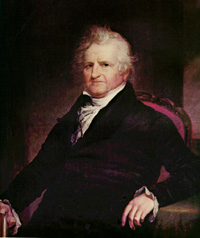- Joseph Bradley Varnum
Infobox Officeholder
name =Joseph Bradley Varnum

imagesize =200px
small
caption =
order =7th
office =Speaker of the United States House of Representatives
term_start =October 26 ,1807
term_end =March 4 ,1811
president =Thomas Jefferson James Madison
predecessor =Nathaniel Macon
successor =Henry Clay
order2 =Member of the U.S. House of Representatives
fromMassachusetts 's 9th district
term_start2 =March 4 ,1795
term_end2 =March 3 ,1803
predecessor2 =None; first
successor2 =Phanuel Bishop
order3 =Member of the U.S. House of Representatives
fromMassachusetts 's 4th district
term_start3 =March 4 ,1803
term_end3 =March 4 ,1811
predecessor3 =Seth Hastings
successor3 =William M. Richardson
order4 =United States Senator
fromMassachusetts
term_start4 =June 29 ,1811
term_end4 =March 3 ,1817
predecessor4 =Timothy Pickering
successor4 =Harrison Gray Otis
order5 =President pro tempore of the United States Senate
term_start5 =December 6 1813
term_end5 =February 3 ,1814
predecessor5 =William H. Crawford
successor5 =John Gaillard
birth_date =January 29 ,1751
birth_place =Dracut, Massachusetts
death_date =December 21 ,1821 (aged 70)
death_place =Dracut, Massachusetts
nationality =
party =Democratic-Republican
otherparty =
spouse =
relations =
children =
residence =
alma_mater =
occupation =
profession =
net worth =
religion =
website =
footnotes =Joseph Bradley Varnum (
January 29 ,1751 –September 21 ,1821 ) was a U.S. politician of theDemocratic-Republican Party fromMassachusetts .Biography
Joseph Bradley Varnum was born in
Dracut, Massachusetts , Middlesex County, January 29, 1750 or 1751, a farmer with little formal education.After serving n the
Massachusetts militia during theAmerican Revolutionary War , Varnum was elected to the Massachusetts House of Representatives (1780–1785) and then the Massachusetts State Senate (1786–1795). He also served as a Justice of the Massachusetts Court of Common Pleas and as Chief Justice of the Massachusetts Court of General Sessions.In 1794, Varnum was elected to the U.S. House of Representatives, where he served from
March 4 ,1795 until his resignation onJune 29 ,1811 . During his last four years in the House, he served as its Speaker.Varnum was elected to the U.S. Senate in 1811 to fill the vacancy in the term. June 29, 1811, to March 3, 1817; served as President pro tempore of the Senate during the Thirteenth Congress; chairman, Committee on Militia (Fourteenth Congress); after returning to Massachusetts in 1817, he again served in the Massachusetts State Senate, until his death September 21, 1821.
Varnum died in Dracut, and his body is interred in Varnum Cemetery. His brother was
James Mitchell Varnum .lave Trade
In the 1787 US Constitution there was a provision in Article I – the part of the document dealing with the duties of the legislative branch:
Section 9. The migration or importation of such persons as any of the states now existing shall think proper to admit, shall not be prohibited by the Congress prior to the year one thousand eight hundred and eight, but a tax or duty may be imposed on such importation, not exceeding ten dollars for each person.
In other words, the government could not ban the importation of slaves for 20 years after the adoption of the Constitution. And as the designated year 1808 approached, those opposed to slavery began making plans for legislation that would outlaw the trans-Atlantic slave trade.
On March 3, 1805, Congressman Joseph Bradley Varnum [1751-1821] , Dracut, MA [now Lowell] submitted the follow Massachusetts Proposition to amend the Constitution and Abolish the Slave Trade. This proposition was table until 1807, when under Joseph Bradley Varnum leadership the amendment moved through Congress and passed both houses on March 2, 1807. Slave owner and President Thomas Jefferson signed it into law on March 3, 1807. Due to the restriction imposed by Article I, Section of the Constitution, the law did not become effective until January 1, 1808.
"'JOURNAL OF THE HOUSE OF REPRESENTATIVESOF THE UNITED STATES, 1804-1807SUNDAY, MARCH 3, 1805"'
Congressman Joseph Bradley Varnum, one of the members for the State of Massachusetts, presented to the House a letter from the Governor of the said State, enclosing an attested copy of two concurrent resolutions of the Senate and House of Representatives of the State of Massachusetts, passed the fifteenth of February, in the present year, "instructing the Senators, and requesting the Representatives in Congress, from the said State, to take all legal and necessary steps, to use their utmost exertions, as soon as the same is practicable, to obtain an amendment to the Federal Constitution, so as to authorize and empower the Congress of the United States to pass a law, whenever they may deem it expedient, to prevent the further importation of slaves from any of the West India Islands, from the coast of Africa, or elsewhere, into the United States, or any part thereof:" Whereupon,
A motion was made and seconded that the House do come to the following resolution:
Resolved by the Senate and House of Representatives of the United States of America in Congress assembled, two-thirds of both Houses concurring, That the following article be proposed to the Legislatures of the several States, as an amendment to the Constitution of the United States, which, when ratified by three-fourths of the said Legislatures, shall be valid to all intents and purposes, as a part of the said Constitution, to wit:
"That the Congress of the United States shall have power to prevent the further importation of slaves into the United States and the Territories thereof."
The said proposed resolution was read, and ordered to lie on the table.
References
* Varnum, Joseph. “Autobiography of General Joseph B. Varnum.” Edited by James M. Varnum. Magazine of American History 20 (November 1888): 405-14.
Wikimedia Foundation. 2010.
